Smoothed Jazz
In April 2020, Donovan Mitchell huddled alone inside his suburban Connecticut home. The pandemic was rippling through the U.S., shutting down everything from office buildings to the SoulCycle that hosted Mitchell’s favorite spinning class.
His team, the Jazz, was at the epicenter of it all.
A month earlier the NBA season had come to an abrupt halt. All-Star center Rudy Gobert tested positive for COVID-19, days after mockingly touching every microphone he could during a press conference. Mitchell tested positive as well, and reports that he was frustrated with Gobert had placed their relationship under intense scrutiny.
With limited options to pass the time, Mitchell—who never experienced COVID-19 symptoms—dug into film of his games. Not the good ones, the performances that had powered the 6' 1" guard to an All-Star appearance in his third season. The bad ones—60 or 70, Mitchell estimates. The poor shooting nights. The games with high turnovers. The ones where he didn’t score in the fourth quarter. Bleary-eyed, Mitchell would burn through the battery on his laptop, studying defenders who gave him problems. “It’s not always going to be what you do on the court,” says Mitchell. “The work you put into the mental part of the game allows you to understand, O.K., when I get to my drills, how do I work on something that I see in the film?”
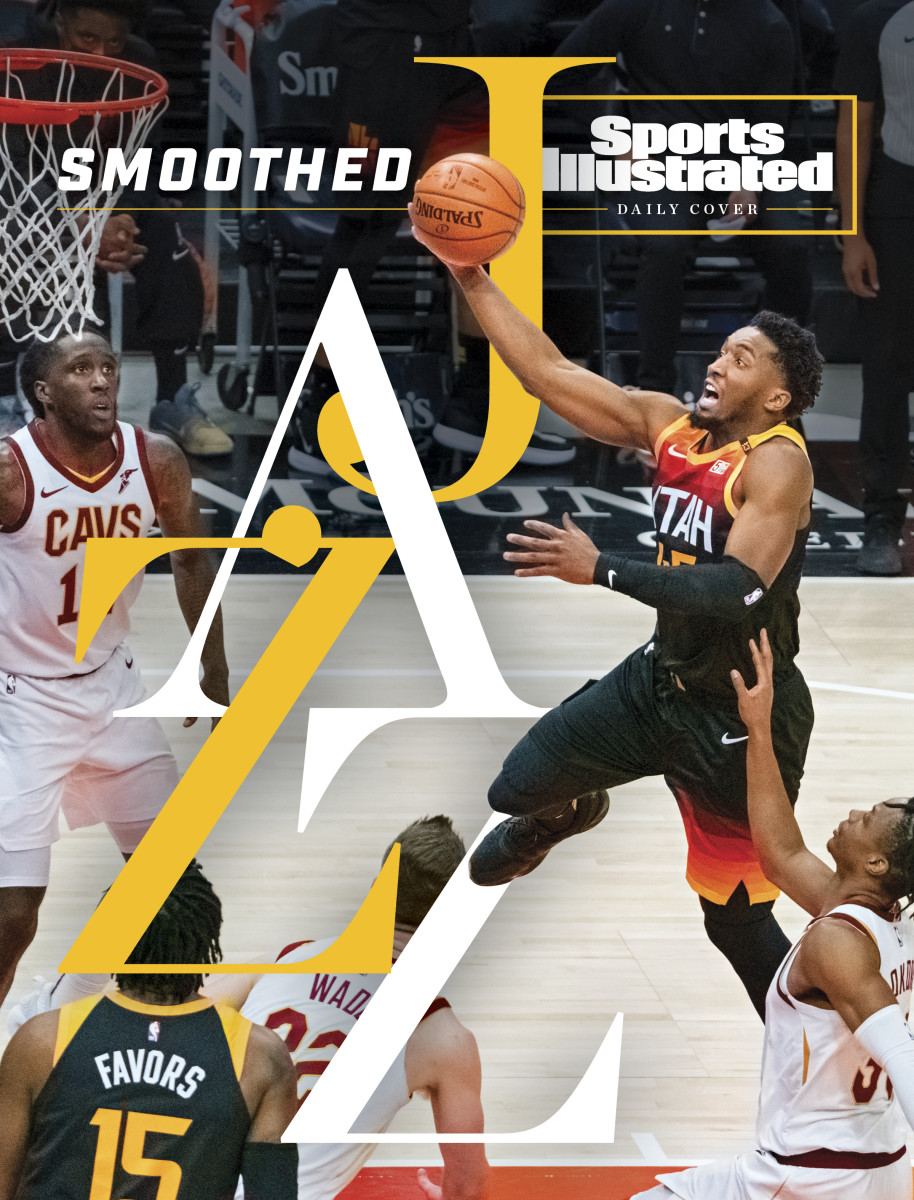
Baseball was Mitchell’s first love, an affection seeded by his father, Donovan Sr., who spent seven seasons as a slap-hitting utility man in the Astros’ minor league system and since 2016 has served as the Mets’ director of player relations. But Donovan Jr.’s dreams of being a pitcher ended during his sophomore year of high school, when he collided with a catcher and broke his wrist. He threw himself into basketball, rising from four-star prospect at Brewster Academy in Wolfeboro, N.H., to All-ACC guard at Louisville, from NBA lottery pick with questions (Too small! Can’t shoot!) to an MVP candidate for a team that has been at or near the top of the Western Conference standings all year.
Everyone in Mitchell’s orbit has a story about his work ethic. Jazz vice president Dennis Lindsey cited it when announcing Mitchell’s five-year, $163 million contract extension last November. On the night it was agreed to, Mitchell went out to dinner in Miami. At 6 a.m., he was in the gym.
In Utah, Mitchell has developed in a relatively pressure-free environment. He was drafted 13th in 2017, just before Gordon Hayward defected to Boston as a free agent, which immediately lowered expectations in Salt Lake City. Mitchell scored 20.5 points per game that season, battling Ben Simmons for Rookie of the Year honors. He averaged 24.4 in the playoffs, including a 38-point tour de force in Game 6 against the Thunder, powering the Jazz into the conference semifinals—exactly where they had finished the year before. A second straight trip to the postseason followed, and suddenly Mitchell was the face of one of the NBA’s most compelling young teams. Last season Utah was cruising along at 41–23 in early March, on pace to win 53 games, a total it hadn’t hit in a decade.
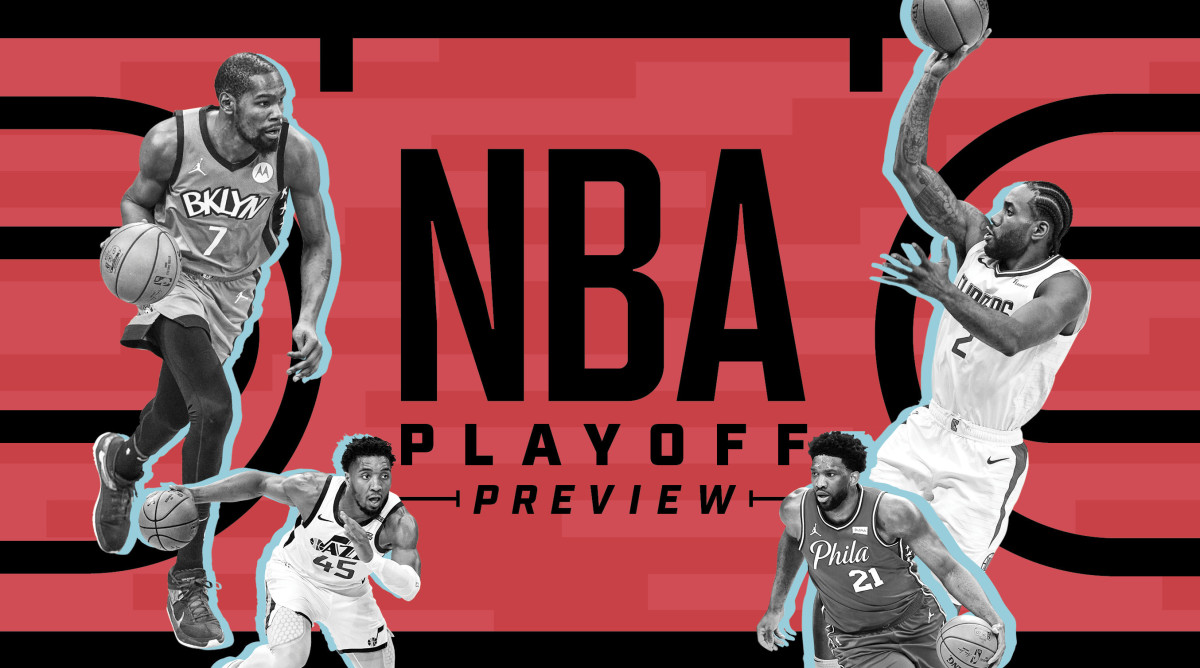
Then, it happened. By now the story is familiar: On March 11 the Jazz were in Oklahoma City. Moments before tip-off, their game was called off when a player—later identified as Gobert—tested positive for COVID-19, and commissioner Adam Silver suspended the season hours later. Gobert began receiving death threats, and stories of a Gobert-Mitchell feud surfaced. The Athletic quoted a source saying the relationship between them “doesn’t appear salvageable.” Almost overnight, Gobert and Mitchell had become Shaq and Kobe.
Lindsey wondered how he was going to piece back together the well-balanced team he had assembled. After the Rockets’ first-round elimination of Utah in 2019, Lindsey—who had joined the Jazz as GM in ’12—determined the roster needed a shake-up. While the Jazz’s defense had consistently ranked in the top five, their offense was middle of the pack, and teams with superior scorers shot them out of the playoffs. As a onetime assistant GM for the Rockets, Lindsey recalled what Jeff Van Gundy and Tom Thibodeau often said: Get us offensive players. It’s on us to get them to guard. “The game has changed,” says Lindsey. “But there is still a kernel of truth there.” Utah signed small forward Bojan Bogdanovic, an 18-point-per-game scorer with the Pacers. They dealt two first-round picks to the Grizzlies for point guard Mike Conley. Suddenly, the Jazz had the firepower to complement their stingy D.
L’Affaire Gobert threatened all of it. “There was so much misunderstanding,” says Lindsey. “And it was all so public. Rudy shut down the sports world. Everyone just needed to wrap their arms around what happened.” Gobert and Mitchell, Lindsey reasoned, just needed to sit down and talk. The relationship needed to be reset. The bubble in Orlando offered that opportunity.
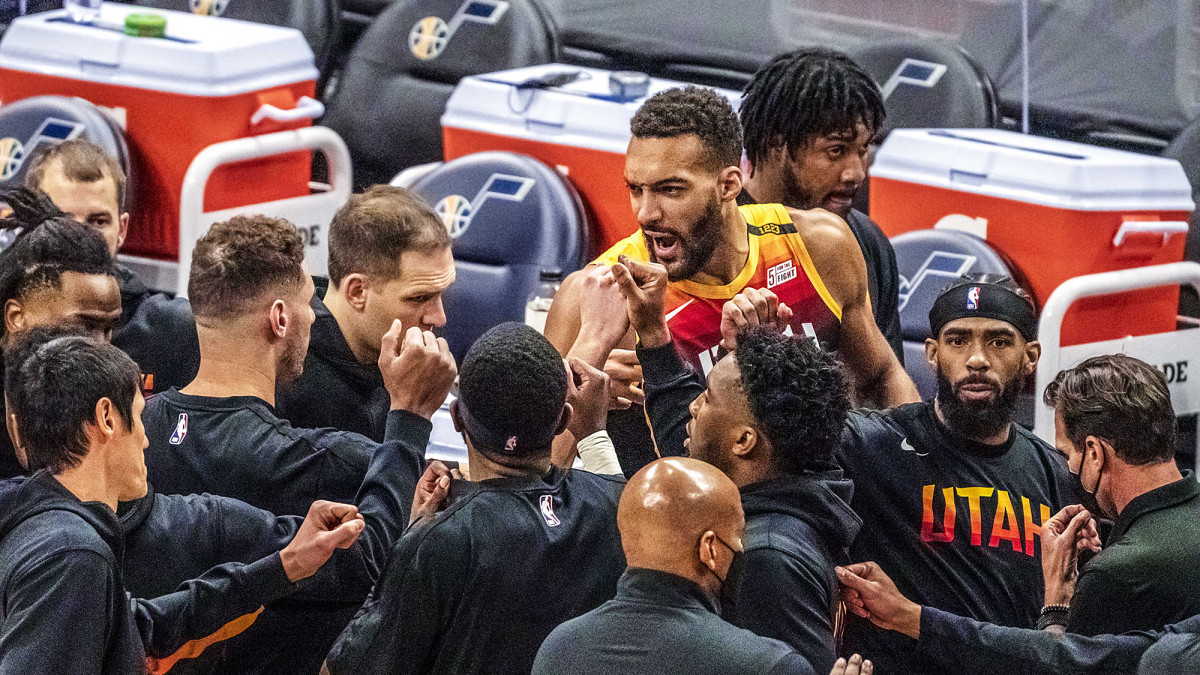
On a sweltering July night inside the Coronado Springs, one of the hotels commandeered by the NBA for its four-month stay on the Disney campus, a group of Jazz players, coaches and support staff gathered around the bar at a tapas restaurant. As the hours passed, the numbers swelled. Gobert dropped in after a workout. High-scoring guard Jordan Clarkson, a midseason acquisition, bonded with the group. They sipped beer and wine, telling stories and cracking jokes until well after midnight. For any other team, it would have been an unremarkable evening. For one in need of healing, it meant so much more.
Publicly, the Gobert-Mitchell relationship received most of the attention. (Well, all of the attention.) Gobert was branded the NBA’s Patient Zero. Mitchell did an interview with Good Morning America in which he downplayed the rift but conceded it had taken him “a while to cool off.” Once the Jazz reassembled in Orlando and began working toward the July 30 restart, there was tension in the locker room. Says veteran forward Joe Ingles, “It was probably good that we had a bit of a break.”
Team-building activities became as important as practice. During the first week in Orlando, the Jazz threw a pool party. They held relay races in the water. Finish last, shotgun a beer. For a few weeks they played beach volleyball, stopping only after the NBA put the kibosh on such activities because of social distancing rules. “Being away from our families, all we had was each other,” says Gobert. “So it was either we can make it happen or we don’t.”
Lindsey agrees. “We needed to be together,” he says. “Ordinarily, if there’s a beef, well, you go to a hotel room. You listen to both parties, you may listen to an agent or two, you listen to the coach’s perspective, maybe the trainer’s perspective. And then you just get the people in the room the next day and you talk it out. And no one hears about it. Because of COVID, we couldn’t do that. But once we did, I would have bet my mortgage it was going to work out.”
It didn’t pay immediate dividends, though: Utah blew a 3–1 lead and got bounced by the Nuggets in the first round. But a foundation for this season had been laid.

Gobert and Mitchell aren’t eager to revisit the friction between them. The two buried the hatchet in a series of phone calls before the bubble, using the time together in Florida to strengthen their connection. “They addressed things, man-to-man,” says Conley. A few weeks after Mitchell signed his extension, Gobert agreed to his own five-year, $205 million deal. In the locker room, the two routinely talk basketball. “Not one ounce of me thought that it was going to be over or one player was going to say, ‘I want to leave,’ or ‘He has to leave,’ ” says Ingles. “Literally, not 1% in my body thought that. It’s kind of like, S--- happens. But I’m glad that we were able to reconnect and rebuild.”
Says Gobert, “I feel like all of those experiences just made me stronger. You just get thicker skin when you go through stuff in general. I just feel like what happened—it’s all about enjoying the moment, enjoying the journey. And whether you have tough times [or] great times, it’s all about the trying to enjoy yourself, and you move forward.”
And experiment. Lindsey and GM Justin Zanik had assembled a potent roster. In the bubble, coach Quin Snyder supercharged it. Before the NBA shut down, Utah was attempting a modest—by modern standards, anyway—34.4 three-pointers per game. In Orlando the Jazz jacked up 42.1. With Bogdanovic out with a wrist injury, Utah needed to find ways to create more spacing. That meant more threes. Quicker threes. That trend carried over into this season, with the Jazz surging up the standings behind one of the most prolific and efficient three-point shooting attacks. Everyone, says Mitchell, has the green light. Ingles recalls an early Jazz scrimmage, when Snyder barked at him to shoot. When Ingles looked up, there were 20 seconds on the shot clock. Mitchell tells Ingles he wants him to shoot 15 threes every game. (Ingles usually settles for around six.)
“There’s never a time where we get upset over a three-point shot that a guy takes,” says Mitchell. “There’s no, ‘My bads,’ there’s no, ‘I shouldn’t have shot it,’ there’s no in-between. It’s definitive. It’s a definitive decision that you make, and I feel like that gives guys confidence.”
If there was one Jazz player who didn’t welcome the season’s suspension, it was Conley. After a dozen years in Memphis as one of the NBA’s steadiest playmakers, he struggled in Utah, shooting 1 for 16 in his debut. “That started everything,” says Conley, who was thrown off not only by injuries but also by his new surroundings. In Memphis, he had a 40-minute ride to the arena, which he used to mentally focus, even creating a playlist that was the exact length of the trip. In Salt Lake City, his drive was 10 minutes. He even tried taking extra turns to extend the drive.
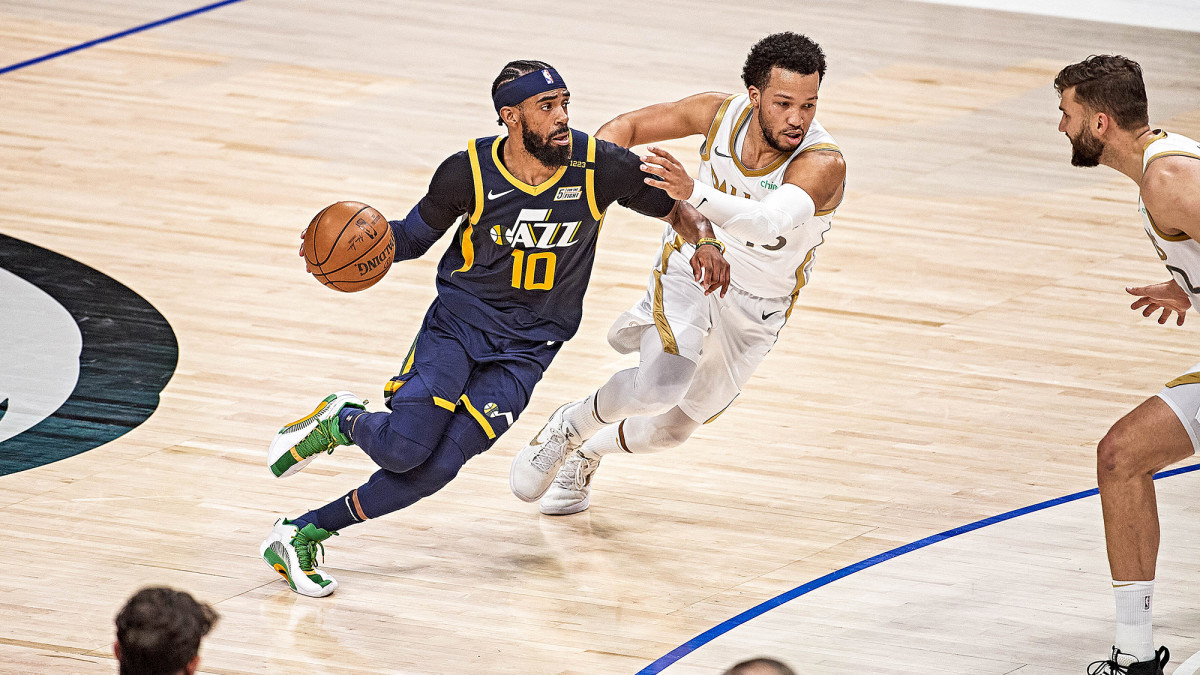
By March, Conley had settled in. This season has seen the return of Memphis Conley—or the arrival of an even better version. He made his first All-Star team. His floater has improved. He ranks among the NBA’s leaders in plus-minus. With the Grizzlies, Conley was used to playing with a defensive-minded backcourt partner in Tony Allen and a versatile offensive big in Marc Gasol. After a year in Utah, Conley has adjusted to life alongside a scoring guard and a D-first big man. “I’m more comfortable with my role more than anything,” says Conley. “Playing without the ball as much, I had to figure out how to stay engaged.”
Even though Conley’s three-pointer to beat Denver in Game 7 rimmed out, the Jazz consider their bubble experience a success. The absence of Bogdanovic created more opportunity for Clarkson and forwards Royce O’Neale and Georges Niang, all of whom have played key roles this season. Mitchell took on more offensive responsibility and responded with an unprecedented outburst. Before last season Utah had one 50-point playoff performance, from Karl Malone in 2000. Mitchell had two in a four-game span. “What I took away from the bubble was that this team could win a championship,” says Gobert. Adds Mitchell, “As much as it hurt to lose, and it still hurts to this day to lose that series, I think that loss really taught us more than winning would have. The loss showed us that we can’t let our foot off the gas with anything. I think the bubble was definitely necessary for us to understand our roles to an even higher degree. And see what we could be.”
As the private plane descended into Atlanta in March, Mitchell’s laptop whirred in front of him. The short flight to All-Star weekend offered another chance to watch film. On-screen: a recent loss to the Pelicans, a game in which he shot 7 for 21. There’s a different focus in Mitchell this season, friends say. He consults with Dwyane Wade, the former Heat star and newly minted Jazz minority owner, about training habits. He cut out desserts, reporting to camp at 215 pounds, the leanest of his career. He’s stronger, allowing him to get where he wants on the floor. He’s more decisive, stopping sharply for midrange pull-ups or powering straight to the rim. He has developed a Chris Paul–like ability to terrorize opponents from the elbow. “The shots he’s taking, they have been perfect,” says Conley. “He’s getting what he wants in key moments of games. He’s not putting himself in a position where the defense dictates where he shoots.”
Small-market success is common in today’s NBA. The Spurs built a dynasty. The Thunder nearly built another. Cleveland advanced to four straight Finals. But San Antonio had Tim Duncan, and later Kawhi Leonard, flanked by Manu Ginóbili and Tony Parker. OKC had Kevin Durant and Russell Westbrook; the Cavaliers had that LeBron guy.
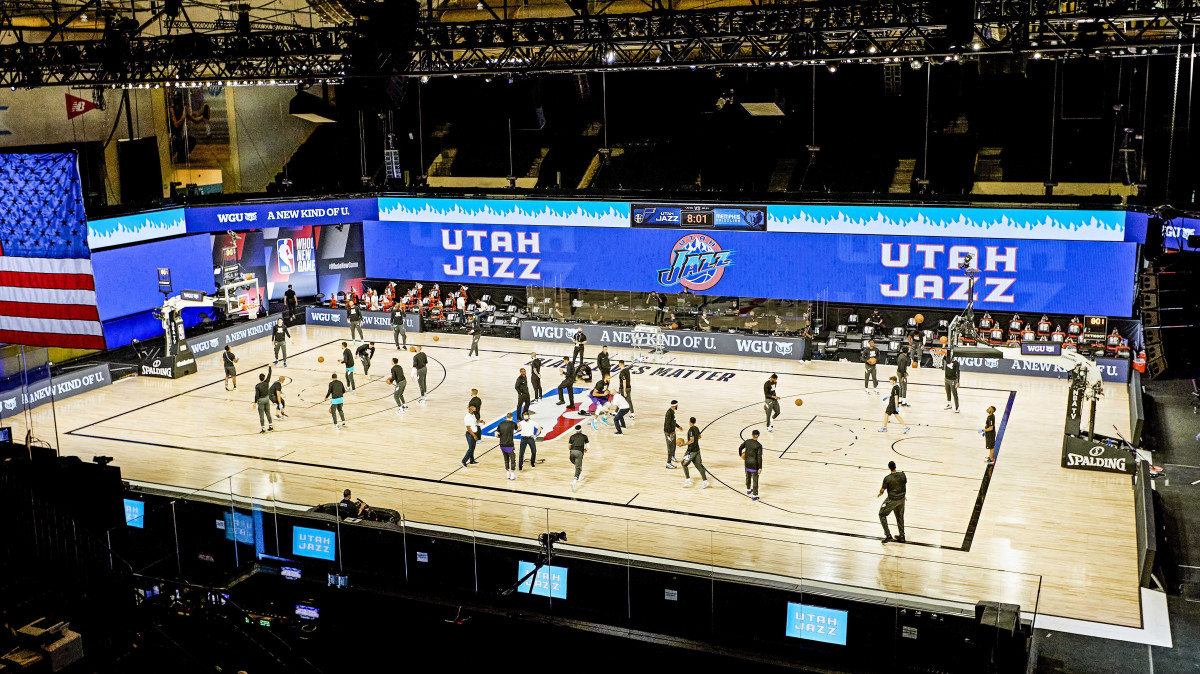
Utah has assembled one of the NBA’s most well-rounded teams. Ingles leads a lethal group of three-point shooters. Clarkson is a contender for Sixth Man of the Year. The 6' 4" O’Neale has emerged as one of the NBA’s best perimeter stoppers. “He’s first team All-Defense,” says Mitchell. Gobert is back to peak form. Some of the Jazz’s defensive slips last season can be attributed to Gobert’s tamping down his aggressiveness, fearful of foul trouble without experienced depth behind him. After the season he asked management to bring back Derrick Favors, whom the Jazz had traded a year earlier. They did, signing the 6’ 9” veteran to a three-year, $27 million contract. With Favors backing him up, Gobert is soon likely to become a three-time Defensive Player of the Year, blocking shots at a career-best rate.
Offensively, Gobert has led the NBA in screen assists since NBA.com began tracking them, in 2016. At times, he set those picks that led to baskets grudgingly; now, he does so with zeal. “He’s bought in on the value of getting guys open looks,” Conley says. Conley will remind Gobert of the success Gasol and Zach Randolph had as pick-and-roll players in Memphis. “Just to constantly get in his head that the more unselfish you are, the more comes your way,” says Conley. “And not to get frustrated when it doesn’t.”
Still, Jazz skeptics outnumber believers. In March, 76ers coach Doc Rivers cited the Lakers and Clippers as the teams to beat. In a January interview on TNT, Shaquille O’Neal told Mitchell that he didn’t have what it takes to get the Jazz to the next level. Shaq’s opinion isn’t uncommon: Any doubts about Utah begin with a belief that the 24-year-old Mitchell isn’t ready—or isn’t capable—of taking over games in the playoffs. (Utah lost Mitchell’s 57-point game against the Nuggets, and in the Game 7 defeat in which the team scored just 78 points, he had nine turnovers.)
Yet in addition to Bogdanovic’s absence, Conley missed the first two games of the series for family reasons. Denver advanced to the conference finals, knocking off the Clippers. “That could have been us,” says Gobert. For those who question whether Mitchell can dominate in the postseason, the Jazz point to the shootout he had with the Thunder in 2018 and the 36.3 points he averaged against the Nuggets. “If it’s just going to be solely on one guy,” says Lindsey, “I don’t know why anyone would think he can’t do it.”
Mitchell shrugs at the doubters. “This is uncharted territory for me,” he says. “I’m honest about that. But the goal is to win the ’ship. We’re not stopping until we do.” A few minutes later, he ducks out of a Zoom interview. The Jazz have a game in a few hours, and he has film to watch.
More NBA:
• Cam Payne's Career Is Back From the Dead
• How Dejounte Murray Found His Way
• What Happened to Coach-Star Relationships?
• The All-League Pass Team
